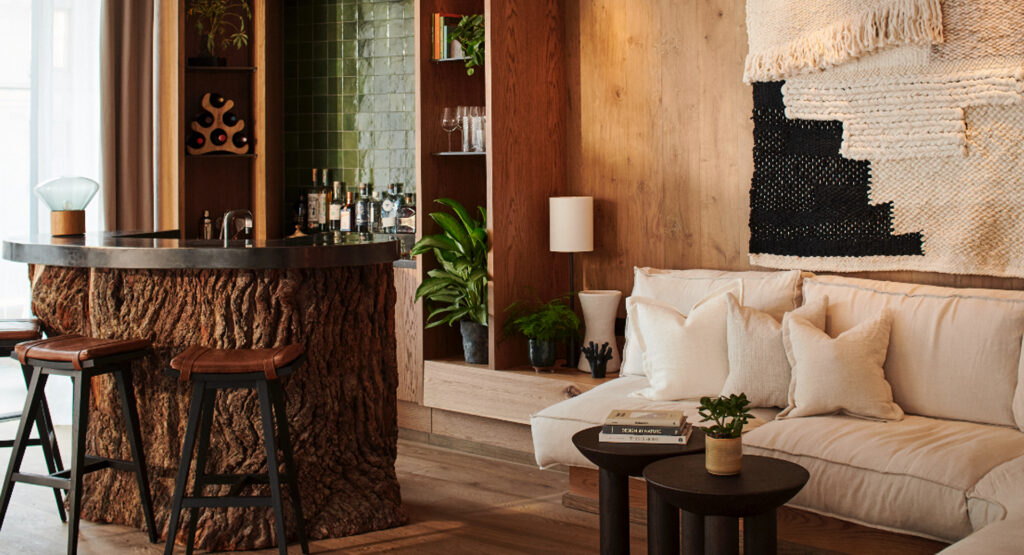The hospitality industry thrives on innovation, constantly evolving to meet the shifting tastes and expectations of consumers. As we step into 2025, a new wave of design trends is set to redefine the industry, focusing on sustainability, technology, and unforgettable guest experiences. No longer is opulence the ultimate goal – today’s hospitality venues are embracing immersive, experience-driven spaces that reflect local culture, prioritise eco-conscious practices, and deliver personalised services.
The future of hospitality design lies in creating sanctuaries where guests can unwind, connect, and feel truly at home. From unique branded environments to cutting-edge spatial planning, these trends are reshaping how we think about hospitality.
Here we explore the top hospitality design trends set to make their mark in 2025.

Sustainability as Standard
Eco-conscious design is no longer optional but a necessity. In 2025, hotels, restaurants, and leisure venues across the UK are doubling down on sustainability. Innovations such as high-end recycled fabrics, locally sourced materials like regional stone, and versatile performance textiles are enabling venues to marry environmental responsibility with sophisticated style. Key trends include:
- Biophilic Design: Integrating natural elements such as indoor gardens, green walls, and abundant natural light to create serene environments.
- Sustainable Materials: A focus on recycled, reclaimed, and locally sourced materials for furniture, fixtures, and décor.
- Energy Efficiency: Smart energy solutions like solar panels, energy-efficient lighting, and climate-responsive architecture.
Flexible and Multi-Functional Spaces
The post-pandemic shift towards hybrid lifestyles continues to influence hospitality design. Spaces need to serve multiple purposes:
- Work-Life Balance: Co-working lounges within hotels cater to digital nomads and business travellers alike.
- Modular Design: Furniture and layouts that adapt to different events, from intimate gatherings to large conferences.
- Pop-Up Potential: Spaces that easily transform for seasonal or themed events are gaining traction.
Bold, Expressive Interiors
While minimalism remains popular, many venues are embracing bold, maximalist designs to stand out:
- Vivid Colours: We’re not talking neon here, but 2025 will see a return of rich jewel tones and daring combinations – emerald green, sapphire blue, and ruby red.
- Statement Pieces: Sculptural furniture and oversized art installations create Instagrammable moments.
- Playful Patterns: Mixing textures and patterns for a dynamic, layered look.
Wellness-Driven Design
Well-being remains a top priority for guests, leading to thoughtful wellness integration:
- Spa-Like Features: Guest rooms equipped with yoga mats, circadian lighting, and aromatherapy options.
- Holistic Dining: Menus focusing on organic, plant-based, and functional foods.
- Stress-Free Spaces: Minimalist aesthetics paired with calming colour palettes to promote relaxation.
Localisation and Cultural Storytelling
Consumers in 2025 crave authentic and immersive experiences. Hospitality venues are responding by:
- Showcasing Local Artisans: Featuring local craftsmanship in interior design and gift shops.
- Cultural Narratives: Rooms and communal areas tell stories through curated artefacts, photography, and murals.
- Regional Flavours: Incorporating local ingredients and traditional recipes into restaurant menus.
Outdoor Living Spaces
Increased demand for outdoor areas continues to influence hospitality design:
- Alfresco Dining: Weather-proofed patios and rooftop terraces with heating and retractable coverings.
- Natural Retreats: Expansive gardens and outdoor wellness areas like meditation pods and walking trails.
- Social Spaces: Fire pits, outdoor bars, and communal seating that foster connection.
Final Thoughts: 2025 is all about Balance.
In 2025, interior design is finding harmony between simplicity and luxury, technology and nature, sustainability and style. The focus is on creating meaningful, lasting experiences that deeply connect with guests.